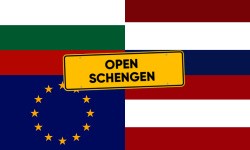The Netherlands has granted approval for Bulgaria’s inclusion in the Schengen area, as per a report by “Reuters.” Prime Minister Nikolai Denkov, speaking after the European Council meeting in Brussels, anticipated positive news, highlighting the crucial decision made by the Dutch government.
“Happy to announce that today the government informed the Parliament of its support for Schengen accession of Bulgaria. NL already expressed its support for full application of Schengen acquis to România in December 2022. My congrats to both countries for the good work done!”
This was said by Willemijn van Haaften, the ambassador of the Kingdom of the Netherlands to Romania in a post on the “X” platform
Nikolai Denkov emphasized the extensive efforts undertaken in recent months, citing the passage of laws in Bulgaria’s National Assembly and the establishment of a specialized monitoring mechanism linked to the rule of law. He attributed the positive outcome to November’s successful mission in Sofia involving the Netherlands and Austria.
“To reach this point, there’s been considerable progress—a series of laws passed in our National Assembly, the establishment of a special monitoring mechanism related to the rule of law, and a fruitful mission in November attended by delegates from the Netherlands and Austria. These indicators paved the way for what we hope will be a favorable decision from the Netherlands,” Denkov stated optimistically.
The Dutch Parliament now needs to review and finalize the decision to lift their veto.
Political power dynamics shifted following the Dutch elections, wherein Geert Wilders’ Eurosceptic party showcased unexpected strength. However, this outcome has complicated the formation of a governing coalition, possibly extending negotiations for months. Prime Minister Mark Rutte’s government has persisted in its functions throughout this period, expected to remain in power even if forming a successor government becomes untenable, potentially leading to extraordinary elections.
During discussions at the European Council sidelines, the Bulgarian Prime Minister and Romanian President Klaus Iohannis engaged with Chancellor Karl Nehammer and European Commission President Ursula von der Leyen concerning Schengen. Mark Rutte’s actions potentially intensify pressure on Nehammer to reconsider his stance, particularly as Austria stands as the sole dissenting voice with less explicit demands compared to the Netherlands, an aspect that impacts Bulgaria and Romania.
Vienna proposed a phased approach for the two countries to enter the passport-free travel zone, suggesting an initial inclusion from airports and ports followed by land borders, albeit without a clearly defined timeline for the latter stage. Reports from Romanian media indicate a willingness in Bucharest to entertain and possibly accept this compromise, despite the drawback that long queues of cargo trucks at borders with Bulgaria and Hungary might persist. Bulgaria holds a more resolute position, demanding a definitive decision from Vienna with specific terms for implementation and complete inclusion in the Schengen area.
Denkov also addressed ongoing negotiations with Austria, indicating that potential solutions are being exchanged in written form. “We are currently in the phase of exchanging possible texts on what a resolution might entail. Until a consensus is reached, these discussions remain preliminary,” he clarified.
Bulgaria’s hopes for Schengen entry are now closer than ever, pending the Dutch Parliament’s decision and ongoing negotiations with Austria.

